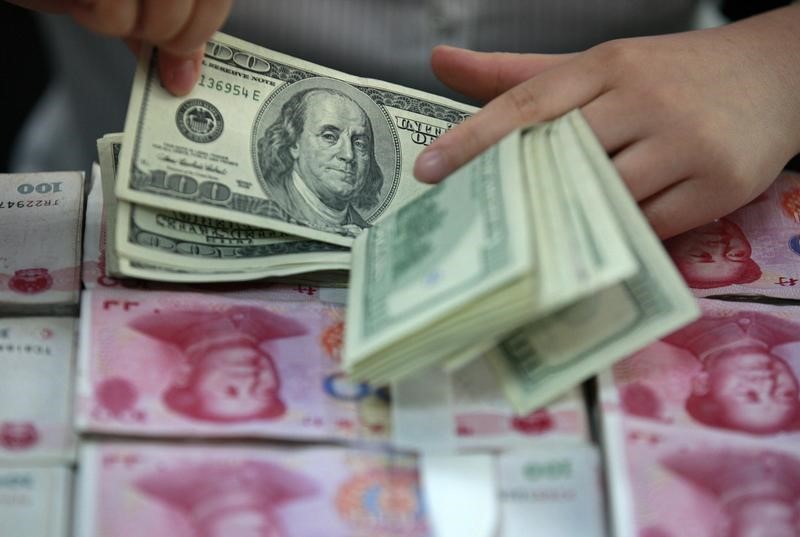By Nigel Stephenson
LONDON (Reuters) - China's shock 2 percent devaluation of the yuan on Tuesday pushed the dollar higher and raised the prospect of a new round of currency wars, just as Greece reached a new deal to contain its debt crisis.
Stocks fell in Asia and Europe as investors worried about the implications of a move designed to support China's slowing economy and exports.
The stronger dollar hit commodity prices, driving crude oil down after Monday's hefty gains, though gold hit three-week highs as investors focused on the risks to the global economy.
Weaker stocks lifted top-rated bonds, with yields on euro zone debt also falling on the Greek deal, struck nine days before Athens is due to repay 3.2 billion euros to the European Central Bank.
China's move, which the central bank described as a "one-off depreciation" based on a new way of managing the exchange rate that better reflected market forces, triggered the yuan's biggest fall since 1994, pushing it to its weakest against the dollar
The Australian dollar
In Asia, the Singapore dollar
Investors who had held euro-funded yuan positions bought back the single currency, pushing it up
U.S. reaction will be crucial. Washington has for years pressed Beijing to free up the exchange rate to allow the yuan to strengthen, reflecting the growth in the world's second-largest economy.
Today, China's economy is slowing and the new exchange rate mechanism gives markets greater ability to push the yuan lower, just as the United States prepares to raise interest rates - a step that should add to dollar strength.
"It does look, however modest, like an attempt to recoup just a small amount of competitive edge lost in international markets," said Simon Derrick, head of currency research at BNY Mellon in London.
"What happens over the next few days matters. If we have a currency that moves much more freely, fine. If, however, we go back and it's just repegged ... that is currency war."
European shares fell. The pan-European FTSEurofirst 300 index (FTEU3) was down 1 percent, led lower by car makers and luxury goods companies, whose products have just got more expensive for Chinese consumers.
"What is good for growth in China is unfortunately bad for everybody else," said Bill McQuaker, co-head of multi-asset at Henderson Global Investors.
Shares in Athens (ATG), however, gained 1.5 percent after the country secured a third bailout deal with creditors, making it the only European bourse to rise.
This followed falls in Asia. MSCI's broadest index of Asia-Pacific shares outside Japan (MIAPJ0000PUS) gave up early gains and was down 1.4 percent at its lowest since February 2014. Japan's Nikkei (N225) slipped 0.4 percent.
On Chinese stock markets, airlines and importers fell, though exporters rose. The CSI300 index (CSI300) of the largest listed companies in Shanghai and Shenzhen lost 0.4 percent and the Shanghai Composite (SSEC) closed flat.
BONDS
The weakness in stocks boosted top-rated bonds. German 10-year yields
The deal on another bailout for Greece also helped yields on lower-rated Spanish and Italian bonds drop 5 bps apiece while Greek two-year yields
"The Chinese devaluation was taken as 'things are not going that well in China' and this is a risk-off move," said Martin van Vliet, senior rate strategist at ING, adding that "with the Greek deal secured and the ECB continuously buying bonds, peripheral spreads would have been much tighter (but for China)".
Oil prices fell as dollar-priced commodities became more expensive, weighing on demand. Brent crude
Gold

"Probably gold is benefiting from fears that this is a new round of 'currency war'," Macquarie analyst Matthew Turner said, adding that China's move had increased uncertainties about the global economy, which tends to be good for gold.